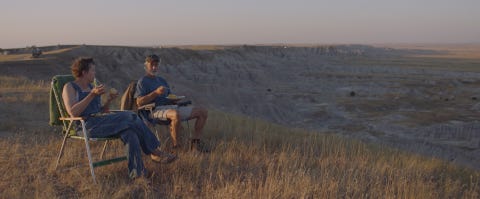That was then. The many headlines about civil unrest in the USA during the past year make the prospect of a civil war less preposterous, or at least a more popular subject for discussion. On February 19 Michael appeared on John's show to discuss his latest blog post, Show Trial: Bellows of Civil War - "Strongarm political theater stokes the fires scorching our constitutional order." (Audioboom podcast JBS Show: Part 1 and Part 2 ). The show trial he's referring to, actually two of them, are the impeachment trials of Donald Trump.
I should add that Michael and John are not predicting the outbreak of a civil war, they've been asking whether one could occur in the relatively near term. But they've been asking at such length and in such detail, with references to the actual civil war in the USA, it's obvious they believe there is a clear danger of another American secessionist war in the not too distant future.
Below are the notes at Audioboom on the Batchelor-Vlahos discussion, although I recommend that you also listen to the podcast. Following the notes I'll relate my thoughts on the civil-war question.
(The term 'show trial' relates specifically to the infamous courtroom 'trials' in the Soviet Union, which weren't trials as we understand them in a democracy. The accused had already been found guilty by the prosecutor and appeared in court only for the charges to be read out and the sentence handed down.)
Michael E Vlahos: @JHUWorldCrisis; Johns Hopkins; in re: Are we in a civil war? Looking for road signs.My view is that they didn't have the NSA in Abraham Lincoln's time. They didn't have the WTO either. Nor did they have large pensions for retired American military personnel, if they had pensions at all in those days, as well as other benefits of being enlisted in the military in today's USA.
The escalation becomes obvious only after violence starts. One indication is the show trial of the president at the beginning of the pandemic; then a second show trial ending with a not guilty verdict in the Senate in February 2021.
A show trial is part of the narrative that, here, the Democrats seek to establish. Blue [Democrat] and red [Republican], global and national, urban and rural.
The Speaker of the House announces a commission to investigate 6 Jan events. Why? The new president [Biden] had said, “Enough about Donald Trump.”
Strategy of persecution/inquisitions of red; now charged with being potentially criminal. In operatic terms, the show trial of February is the basis for creating a criminal case against red, being called an evil, terrorist element [by] blue-controlled media. Leading to an emplacement of an anti-red pogram, institutional stance by the dominant agencies of law enforcement.
Donald Trump was the bridge, is now left behind.
Salon.com: “Now the Republicans are the party of terrorism.” This commission, like the 9/11 Commission, which provided impetus for the War on Terror, and all of that stripped away civil liberties and protection for Americans; the Patriot Act.
Blue’s goal is to put aside the electoral factor that’ll keep them in power, instead create a dispensation from outside politics to criminalize red. Will criminalize the popular dimensions of red. GOP [such as Romney]: You can be rump Republicans, Vichy collaborators. The others will be “terrorists.”
Blue will then be in total control.
HR 1: bill that’ll upend electoral politics by creating a system inherently and forever going to wire outcomes in any election for blue; doing this via shenanigans to allow blue to dominate for the next several generations.
Anyone will be able to vote with no oversight or control. Reminiscent of 1860s [U.S. Civil War era].
https://www.anewcivilwar.com/post/show-trial-bellows-of-civil-war
[END NOTES]
Which is to say I believe there is no chance there will be another secessionist war in the United States. Any attempt at secession would be nipped in the bud, and without a shot fired.
All it would take is the tactics used by the Democratic Party to portray the Republican Party as the party of terrorists in the wake of the January 6 incursion by Trumpians into Washington's Capitol building -- tactics which relied heavily on a compliant media and a badly informed public audience.
Add to this the machinations of tacticians in the U.S. defense and intelligence fields should any real threat of secession emerge. By the time those characters were finished fooling around with the nation's head, Americans would be too confused and fragmented in their views to get up a serious secession movement, let alone die fighting for it.
This doesn't rule out chatter about secession, but we have seen how well counter-chatter works in today's USA. Five minutes after the chatter starts, the counter-chatterers are busy at their laptops.
There is, however, an appreciable challenge to the United States holding together even without threat of secession. The challenge is rooted in the dissolution of a class of Americans who form the backbone of this country -- people who had always worked hard in the attempt to keep up a middle-income existence. Significant numbers of these Americans, many of them finding they were too broke to retire, were forced into a nomad-like existence by the Great Recession and now they're being joined by refugees from the Great Pandemic.
They're living in tents, motorized trailers, and RVs and working low-paying jobs where they can find them. In the process they have forged a community of people helping others survive the rigors of nomadism in the 21st Century.
Now, a 2020 film about the nomads has been released in the USA -- Nomadland -- to plaudits from the movie biz and the mainstream media. (See Time Magazine's laudatory February 15 report, "What to Know About Nomadland and the Real-Life Community Behind the Movie."
This new nomadism has been unstructured -- it's still a stretch to call it a 'movement' -- which is one reason the nomad community has been growing for years under the media radar. Another reason it's been ignored for so long by the media is that it's not political. It's just many Americans from different backgrounds and political persuasions coming to the same conclusion about the futility of trying to keep up a traditional middle-class existence while carrying a crushing debt burden, or finding themselves crushed by it with no job, no savings left, and no house.
As American nomadism becomes more structured, you may trust the Democratic and Republican parties and the federal government won't take it lying down. And they will be prodded to action by businesses and banks that depend on Americans trying to keep up their house mortgages. So there will be all kinds of attempts to co-opt nomadism, some of them relatively benign as with commercializing the lifestyle, and some scary.
So where to now for nomadism? The answer depends on many factors, but I think an important one is that the movement converges with others -- the survivalists, the ever-increasing number of Americans fleeing the cities, back-to-nature 'green' advocates, and Americans pushing back against the huge amount of U.S. land that the federal government controls.
But I think at the top of the list is the large number of Americans who are now completely disenchanted with politics. The entire structure of American society in this era is formed by politics, to the point where the sense of community has been supplanted by it. I think many Americans are rebelling against this inhuman state of affairs.
What they've lacked is action paths -- ways to reconnect with each other without politics. The new nomadism offers one such path, and can provide inspiration for other paths. This will be a pioneering effort, but America was settled by pioneers.
About the photographs in this post
The first one is from a Daily Mail report headlined, "A THIRD of Americans walk around in a zombie-like concussion daze because of a lack of sleep and stress, new study of college athletes finds."
Only a third? They need to expand the study.
The second photo is a scene from Nomadland.
********

